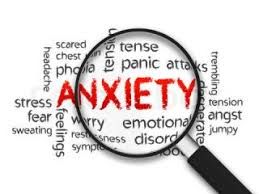Anxiety has become a very common word today for almost every age group.
Anxiety can occur when a person fears that something bad is going to happen. It is a non-medical term that refers to a feeling of fear or worry that is related to a specific issue. Anxiety is a very normal response to stressful events in day to day life like having financial troubles, changing jobs or any kind of troubling thoughts.

Anxiety attacks, also known as panic attacks, are episodes of intense panic or fear. Anxiety attacks usually occur suddenly and comes without any warning.
Anxiety attacks usually peak within 10 minutes and they rarely last for more than 30 minutes. During that short period, you may experience severe terror and feel as if you are about to die or totally lose control over yourself. The physical symptoms of anxiety attacks are themselves very frightening to make many people think they are going to have a heart attack. After an anxiety attack is over, you may worry about having another one.
When symptoms of anxiety become larger than the causes that triggered or caused them, they could be signs of an anxiety disorder.
CAUSES
Researchers don’t know the actual reason that brings on anxiety disorders. Like other forms of mental illness, they stem from a combination of things, including changes in your brainand environmental stress and even your genes. The disorders can run in from families and could be linked to faulty circuits in the brain that control fear and other emotions.
Symptoms of an anxiety attack involve the following-
Surge of overwhelming panic and feeling of losing control as if going crazy
Heart palpitations and chest pain
Feeling like you are going to pass out
Trouble breathing and choking sensation and nausea or stomach cramps
Hyperventilation
Hot flashes or chills
Trembling
Feeling detached from the world (termed as e-realization) or unreal
Numbness or tingling in the limbs or entire body
Panic attacks and panic disorder are not the same thing.
Panic disorder involves recurrent panic attacks along with constant fears of having future attacks
oiding situations that may trigger or remind someone of previous attacks. Not all panic attacks are caused by panic disorder while some other conditions may trigger a panic attack.
There are some tips that can help to lower your anxiety and manage symptoms of a disorder:
Loneliness and isolation can trigger or worsen anxiety. Regularly meet up with friends, join a self-help or support group, or share your worries and concerns with a trusted loved one.
Stress managementcan be of great help. Exercise is a natural stress buster. To achieve the maximum benefit, aim for at least 30 minutes of aerobic exercise on most days. Try walking, running, swimming, martial arts, or dancing
Practice mindfulness meditation, progressive muscle relaxation, and deep breathing.
Get seven to nine hours of quality sleep.
Intake of alcohol can make your anxiety worse. It may seem like cigarettes are calming, nicotine is actually a powerful stimulant that leads to higher, not lower, levels of anxiety. So quit these habits.
Worrying is a mental habit you should learn to break. Strategies such as creating a worry period, challenging anxious thoughts and learning to accept uncertainties can calm your anxious thoughts.
